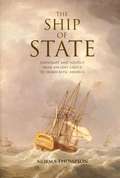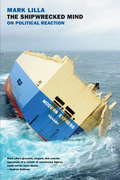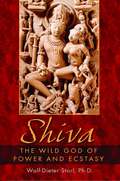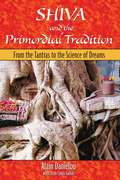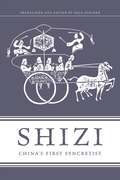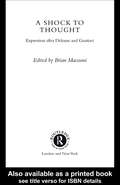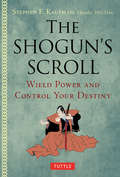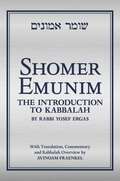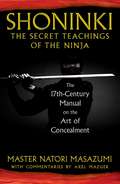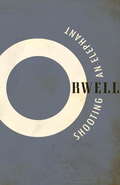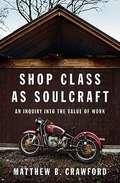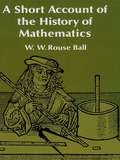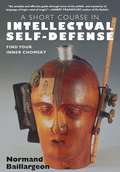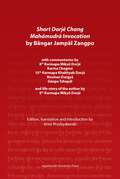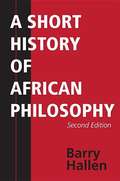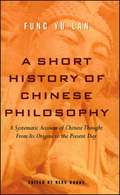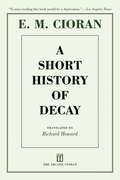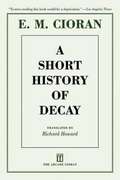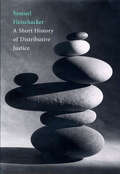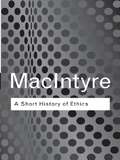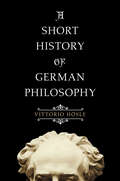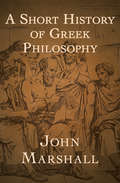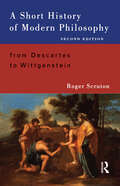- Table View
- List View
The Ship of State: Statecraft and Politics from Ancient Greece to Democratic America
by Norma ThompsonThe stimulus for this book initially came from Tocqueville's study of America.
The Shipwrecked Mind: On Political Reaction
by Mark LillaWe don't understand the reactionary mind. As a result, argues Mark Lilla in this timely book, the ideas and passions that shape today's political dramas are unintelligible to us. The reactionary is anything but a conservative. He is as radical and modern a figure as the revolutionary, someone shipwrecked in the rapidly changing present, and suffering from nostalgia for an idealized past and an apocalyptic fear that history is rushing toward catastrophe. And like the revolutionary his political engagements are motivated by highly developed ideas. Lilla begins with three twentieth-century philosophers--Franz Rosenzweig, Eric Voegelin, and Leo Strauss--who attributed the problems of modern society to a break in the history of ideas and promoted a return to earlier modes of thought. He then examines the enduring power of grand historical narratives of betrayal to shape political outlooks since the French Revolution, and shows how these narratives are employed in the writings of Europe's right-wing cultural pessimists and Maoist neocommunists, American theoconservatives fantasizing about the harmony of medieval Catholic society and radical Islamists seeking to restore a vanished Muslim caliphate. The revolutionary spirit that inspired political movements across the world for two centuries may have died out. But the spirit of reaction that rose to meet it has survived and is proving just as formidable a historical force. We live in an age when the tragicomic nostalgia of Don Quixote for a lost golden age has been transformed into a potent and sometimes deadly weapon. Mark Lilla helps us to understand why.
Shiva: The Wild God of Power and Ecstasy
by Wolf-Dieter StorlAn extensive look at all the aspects of multi-natured Shiva• Explores the shamanic roots of world spirituality as exemplified by this Hindu god who shares many of the attributes of the Norse Odin and the Celtic Cernunnos• Looks at Shiva’s relation to contemporary culture, Tantra, and the dualistic religions of the WestTo his devotees Shiva is the entire universe and the core of all beings. Hindu myth shows him appearing at the beginning of creation as a giant pillar of fire from which this world sprang forth. Yet he is also the most approachable of gods, for he is the lover of lovers and the devotee of his devotees. Of the 1,008 names of Shiva, Pashupati, Lord of Animals, is one of the most common. His special relation to animals along with his trickster nature reveal the deep connection of Shiva to shamanism and other gods such as the Norse Odin and the Celtic Cernunnos that came out of the Paleolithic traditions.Ethnologist Wolf-Dieter Storl was first captivated by Shiva when he was in India as a visiting scholar at Benares Hindu University. In this book he invites readers to join in the lively and mythical world of Shiva, or Mahadev, God of All Gods. Shiva is a study in contrasts: As the lord of dance he looses himself in ecstatic abandon; with his consort Parvati he can make love for 10,000 years. Both men and women worship him for his ability to unite and balance masculine and feminine energies. But as the ascetic Shankar he sits in deep meditation, shunning women, and none dare disturb him lest he open his third eye and immolate the entire universe. Lord of intoxicants and poisons, he is the keeper of secret occult knowledge and powers, for which he is worshipped by yogis and demons alike. Shiva dances both the joy of being and the dance of doom--but in every aspect he breaks through the false ego to reveal the true self lying within. This is his true power.
Shiva and the Primordial Tradition: From the Tantras to the Science of Dreams
by Alain Daniélou Jean-Louis GabinAn extensive examination of the underpinnings of the Shaivite Tradition • Reveals the influence of Shaivism on the Western world • Discusses Shaivism’s understanding of sacred sexuality • Presents the connections between Vedic poetry and metaphysics In Shiva and the Primordial Tradition, Alain Daniélou explores the relationship between Shaivism and the Western world. Shaivite philosophy does not oppose theology, cosmology, and science because it recognizes that their common aim is to seek to understand and explain the nature of the world. In the Western world, the idea of bridging the divide between science and religion is just beginning to touch the edges of mainstream thought.This rare collection of the late author’s writings contains several never-before-published articles and offers an in-depth look at the many facets of the Samkhya, the cosmologic doctrines of the Shaivite tradition. Daniélou provides important revelations on subjects such as the science of dreams, the role of poetry and sexuality in the sacred, the personality of the great Shankara, and the Shaivite influence on the Scythians and the Parthians (and by extension, the Hellenic world in general). Providing a convincing argument in favor of the polytheistic approach, he explains that monotheism is merely the deification of individualism--the separation of humanity from nature--and that by acknowledging the sacred in everything, we can recognize the imprint of the primordial tradition.
Shivers Down Your Spine: Cinema, Museums, and the Immersive View (Film and Culture Series)
by Alison GriffithsFrom the architectural spectacle of the medieval cathedral and the romantic sublime of the nineteenth-century panorama to the techno-fetishism of today's London Science Museum, humans have gained a deeper understanding of the natural world through highly illusionistic representations that engender new modes of seeing, listening, and thinking. What unites and defines many of these wondrous spaces is an immersive view-an invitation to step inside the virtual world of the image and become a part of its universe, if only for a short time.Since their inception, museums of science and natural history have mixed education and entertainment, often to incredible, eye-opening effect. Immersive spaces of visual display and modes of exhibition send "shivers" down our spines, engaging the distinct cognitive and embodied mapping skills we bring to spectacular architecture and illusionistic media. They also force us to reconsider traditional models of film spectatorship in the context of a mobile and interactive spectator. Through a series of detailed historical case studies, Alison Griffiths masterfully explores the uncanny and unforgettable visceral power of the medieval cathedral, the panorama, the planetarium, the IMAX theater, and the science museum. Examining these structures as exemplary spaces of immersion and interactivity, Griffiths reveals the sometimes surprising antecedents of modern media forms, suggesting the spectator's deep-seated desire to become immersed in a virtual world. Shivers Down Your Spine demonstrates how immersive and interactive museum display techniques such as large video displays, reconstructed environments, and touch-screen computer interactives have redefined the museum space, fueling the opposition between public and private, science and spectacle, civic and corporate interests, voice and text, and life and death. In her remarkable study of sensual spaces, Griffiths explains why, for centuries, we keep coming back for more.
Shizi: China's First Syncretist
by Paul FischerBy blending multiple strands of thought into one ideology, Chinese Syncretists of the pre-imperial period created an essential guide to contemporary ideas about self, society, and government. Merging traditions such as Ruism, Mohism, Daoism, Legalism, and Yin-Yang naturalism into their work, Syncretists created an integrated intellectual approach that contrasts with other, more specific philosophies. Presenting the first full English translation of the earliest example of a Syncretist text, this volume introduces Western scholars to both the brilliance of the syncretic method and a critical work of Chinese leadership.Written by Shi Jiao, China's first syncretic thinker, during the Warring States Period of 481 to 221 BCE, Shizi is similar to Machiavelli's The Prince in that it dispenses wisdom to would-be rulers. It stresses the need for leaders to be detached and objective. It further encourages self-cultivation and effective government, recommending that rulers maintain self-discipline, hire reliable people, delegate power transparently, and promote others in an orderly fashion. The people, it is argued, will emulate their leader's wisdom and virtue, and a just and peaceful state will result. Paul Fischer provides an extensive introduction and a chapter-by-chapter summary and analysis of the text—outlining the importance of syncretism in Chinese culture—and explores the text's particular features, authorship, transmission, loss, and reconstruction over time. The Shizi set the stage for a long history of syncretic endeavor in China, and its study provides insight into the vital traditions of early Chinese philosophy. It is also a template for interpreting other well-known works, such as the Confucian Analects, the Daoist Laozi, the Mohist Mozi, and the Legalist Shang jun shu.
Shizi: China's First Syncretist
by Paul FischerBridging the divide between social and natural sciences, the contributors to this book use a holistic perspective to explore the relationships between humans and their environment. Exploring short- and long-term local and global change, eighteen specialists in anthropology, geography, history, ethnobiology, and related disciplines present new perspectives on historical ecology. The contributors focus on traditional societies where lands are most at risk from the incursions of complex, state-level societies.
A Shock to Thought: Expression after Deleuze and Guattari (Philosophy And Cultural Studies)
by Brian MassumiA Shock to Thought brings together essays that explore Deleuze and Guattari's philosophy of expression in a number of contemporary contexts. It will be of interest to all those in philosophy, cultural studies and art theory. The volume also contains an interview with Guattari which clearly restates the 'aesthetic paradigm' that organizes both his and Deleuze's work.
The Shogun's Scroll
by Stephen F. KaufmanIn the tradition of The Art of War and The Book of Five Rings, Stephen Kaufman's The Shogun's Scroll offer timeless advice on success in war and life. Written in the voice of Hidetomo Nakadai, a late twelfth century scholar and servant in the court of Minamoto Yoritomo-the first shogun of Japan and one of the world's most ruthless generals-this treatise can be used as a guide for personal development and motivation.
Shomer Emunim: The Introduction to Kabbalah
by Avinoam Fraenkel Rabbi Yosef ErgasThis book is for those: intrigued by the Arizal's (Lurianic) Kabbalah, confused by the debates over Kabbalah's authenticity, fascinated by how centuries-old Kabbalistic ideas converge with modern science, challenged by how the technological changes around us fit in with Torah and Kabbalah, desiring resolution of the ongoing debates over key ideas in Jewish thought, curious to understand exactly who and what the Messiah is. Of the few genuine introductions to Kabbalah, Shomer Emunim stands out prominently for its clarity, brevity and accessibility. Penned in the late 1720s by the master Italian Kabbalist, Rabbi Yosef Ergas, its virtues have been extolled by Kabbalists of note ever since. Shomer Emunim powerfully responds to those who claim Kabbalah was fabricated. It also explains Kabbalistic concepts simply, dispelling the illegitimate views of those encouraging blasphemous religious compromise by distorting those concepts. The original Shomer Emunim Hebrew text, together with its complete, facing-page, English translation and commentary, is presented in an innovative and easily digestible format. This e-book contains words in Hebrew which may not display correctly on all e-reader devices.
Shoninki: The 17th-Century Manual on the Art of Concealment
by Axel Mazuer Master Natori MasazumiThe classic text on the mystical traditions of the ninja now decoded in English • The path of the ninja as an authentic spiritual discipline • Details the art of concealment and espionage, including methods of disguise, survival techniques, and face reading • A ninja response to the Samurai Bushido and the way to mind-body harmony Experts in disguise, infiltration, espionage, and counterintelligence, the ninja had spiritual values and magical traditions that distinguished them from the soldierlike samurai. Their art of ninjutsu, invisible as well as indispensable, was transmitted in secret schools and relied on only a few books, which were written in code. The Shoninki, one of the most important of these coded manuals, was written in 1681 by Master Ninja Natori Masazumi. Presenting all facets of the art of concealment, espionage, and physical prowess, including methods of disguise and survival techniques, this source text also contains teachings on spiritual meditations, psychic powers, the art of face reading, controlling the emotions, and magic spells. Revealing the connection between the ninja and the yamabushi--warrior monks who were endowed with supernatural powers--this classic text confirms the path of the ninja as an authentic spiritual discipline, one of self-realization and detachment and the way to mind-body harmony.
Shooting an Elephant
by George OrwellA biting critique of British imperialism, wrapped in a highly personal story about a police officer in colonial Burma. While he is most famous for his long-form fiction, including such works as Nineteen Eighty-Four and Animal Farm, George Orwell was also an accomplished essayist, and Shooting an Elephant stands as one of his best, and most well known, pieces. Orwell worked as a police officer in Burma earlier in his, and there has been a great deal of debate about whether the story is autobiographical. Penguin Random House Canada is proud to bring you classic works of literature in eibook form, with the highest quality production values. Find more today and rediscover books you never knew you loved.
Shop Class as Soulcraft
by Crawford Matthew B.A philosopher/mechanic destroys the pretensions of the high-prestige workplace and makes an irresistible case for working with one's hands. Shop Class as Soulcraft brings alive an experience that was once quite common but now seems to be receding from society - the experience of making and fixing things with our hands. Those of us who sit in an office and often feel a lack of connection to the material world, a sense of loss, and find it difficult to say exactly what we do all day. For those who felt hustled off to college, then to the cubicle, against their own inclinations, Shop Class as Soulcraft seeks to restore the honour of the manual trades as a life worth choosing. On both economic and psychological grounds, Crawford questions the educational imperative of turning everyone into a 'knowledge worker', based on a misguided separation of thinking from doing, the work of the hand from that of the mind. Crawford shows us how such a partition, which began a century ago with the assembly line, degrades workd for those on both sides of the divide. But Crawford offers good news as well: The manual trades are very different from the assembly line and from dumbed-down white collar work as well. They require careful thinking and are punctuated by moments of genuine pleasure. Based on his own experience as an electrician and mechanic, Crawford makes a case for the intrinsic satisfactions and cognitive challenges of manual work. The work of builders and mechanics is secure; it cannot be outsourced, and it cannot be made obselete. Such work ties us to the local communities in which we live and instills the pride that comes from doing work that is genuinely useful. A wholly original debut, Shop Class as Soulcraft offers a passionate call for self-reliance and a moving reflection on how we can live concretely in an ever more abstract world. 'Matt Craford's, remarkable book on the morality and metaphisics of the repairman looks into the reality of practical activity. It is a superb combination of testimony and reflection, and you can't put it down. 'HARVEY MANSFIELDProfessor of government, Harvard University'This is a deep exploration of craftsmanship by someone with real hands-on knowledge. The book is also quirky, surprising, and sometimes quite moving. 'RICHARD SENNETTAuthor of The Craftsman
A Short Account of the History of Mathematics (Dover Books on Mathematics)
by W. W. BallThis is a new printing, the first inexpensive one, of one of the most honored histories of mathematics of all time. When the last revised edition appeared in 1908, it was hailed by mathematicians and laymen alike, and it remains one of the clearest, most authoritative, and most accurate works in the field. Mathematicians welcomed it as a lucid overview of the development of mathematics down through the centuries. Laymen welcomed it as a work which gave them an opportunity to understand the development of one of the most recondite and difficult of all intellectual endeavors, and the individual contributions of its great men.In this standard work, Dr. Ball treats hundreds of figures and schools that have been instrumental in the development of mathematics from the Egyptians and Phoenicians to such giants of the 19th century as Grassman, Hermite, Galois, Lie, Riemann, and many others who established modern mathematics as we know it today. This semi-biographical approach gives you a real sense of mathematics as a living science, but where Dr. Ball has found that the biographical approach is not sufficient or suited to presenting a mathematical discovery or development, he does not hesitate to depart from his major scheme and treat the mathematics in detail by itself. Thus, while the book is virtually a pocket encyclopedia of the major figures of mathematics and their discoveries, it is also one of the best possible sources for material on such topics as the problems faced by Greek mathematicians, the contributions of the Arab mathematicians, the development of mathematical symbolism, and the invention of the calculus.While some background in mathematics is desirable to follow the reference in some of the later sections, most of the book can be read without any more preparation than high school algebra. As a history of mathematics to browse through, or as a convenient reference work, it has never been excelled.
A Short Course in Intellectual Self Defense: Find Your Inner Chomsky
by Andrea Schmidt Normand Baillargeon CharbWhat is the relationship between democracy and critical thinking? What must a citizen in a democracy know to make the word democracy meaningful? In A Short Course in Intellectual Self-Defense, historian and educator Normand Baillargeon provides readers with the tools to see through the spin and jargon of everyday politics and news reporting in order to decide for themselves what is at stake and how to ask the necessary questions to protect themselves from the manipulations of the government and the media. Whether the issue be the call to what we're told will be a bloodless war, the "debate" around Intelligent Design, or the meaning of a military expenditure, Baillargeon teaches readers to evaluate information and sort fact from official and media spin.
Short Dorjé Chang Mahāmudrā Invocation by Bängar Jampäl Zangpo: with commentaries by 8th Karmapa Mikyö Dorjé, Karma Chagmé, 15th Karmapa Khakhyab Dorjé, Rinchen Dargyä, Gänpo Tshepäl and life-story of the author by 8th Karmapa Mikyö Dorjé
by Artur PrzybysławskiThe volume presents translations and editions of crucial mahāmudrā texts of Tibetan Buddhism. The Invocation by Bängar Jampäl Zangpo is considered one of the most important teachings of the Kagyü tradition. It was commented on by prominent masters and philosophers, whose commentaries are translated here for the first time into a European language.
A Short History of African Philosophy (Second Edition)
by Barry HallenA Short History of African Philosophy discusses major ideas, figures, and schools of thought in philosophy in the African context. While drawing out critical issues in the formation of African philosophy, Barry Hallen focuses on recent scholarship and relevant debates that have made African philosophy critical to understanding the rich and complex cultural heritage of the continent. This revised edition expands the historical perspective, takes account of recent discoveries and new canonical figures, highlights new discussions about gender as a cultural and philosophical phenomenon, clarifies issues regarding indigenous cultures and human rights, and builds on the notion that African philosophy shares methods and concerns of philosophy worldwide. This short reference is an essential resource for students, scholars, and general readers.
A Short History of Chinese Philosophy
by Derk Bodde Yu-Lan FungThe classic chronicle of Chinese philosophical thought from the third millennium to the 20th century.From the sage-kings of ancient China to the 1911 overthrow of the oldest monarchical system in the world, Chinese philosophy has evolved and influenced schools of thought around the world. In an accessible voice, A Short History of Chinese Philosophy clearly illuminates Confucianism, Taoism, Mohism, Yin-Yang, and more. For those interested in philosophy or Asian studies, this is the perfect window into ancient and modern Chinese ideology.
A Short History of Decay
by E. M. Cioran Eugene ThackerE. M. Cioran confronts the place of today's world in the context of human history-focusing on such major issues of the twentieth century as human progress, fanaticism, and science-in this nihilistic and witty collection of aphoristic essays concerning the nature of civilization in mid-twentieth-century Europe. Touching upon Man's need to worship, the feebleness of God, the downfall of the Ancient Greeks and the melancholy baseness of all existence, Cioran's pieces are pessimistic in the extreme, but also display a beautiful certainty that renders them delicate, vivid, and memorable. Illuminating and brutally honest, A Short History of Decay dissects Man's decadence in a remarkable series of moving and beautiful pieces.
A Short History of Decay
by E. M. Cioran Eugene Thacker Richard HowardE. M. Cioran confronts the place of today's world in the context of human history--focusing on such major issues of the twentieth century as human progress, fanaticism, and science--in this nihilistic and witty collection of aphoristic essays concerning the nature of civilization in mid-twentieth-century Europe. <P><P>Touching upon Man's need to worship, the feebleness of God, the downfall of the Ancient Greeks and the melancholy baseness of all existence, Cioran's pieces are pessimistic in the extreme, but also display a beautiful certainty that renders them delicate, vivid, and memorable. Illuminating and brutally honest, A Short History of Decay dissects Man's decadence in a remarkable series of moving and beautiful pieces.
A Short History of Distributive Justice
by Samuel FleischackerDistributive justice in its modern sense calls on the state to guarantee that everyone is supplied with a certain level of material means. Samuel Fleischacker argues that guaranteeing aid to the poor is a modern idea, developed only in the last two centuries. Earlier notions of justice, including Aristotle's, were concerned with the distribution of political office, not of property. It was only in the eighteenth century, in the work of philosophers such as Adam Smith and Immanuel Kant, that justice began to be applied to the problem of poverty. To attribute a longer pedigree to distributive justice is to fail to distinguish between justice and charity. Fleischacker explains how confusing these principles has created misconceptions about the historical development of the welfare state. Socialists, for instance, often claim that modern economics obliterated ancient ideals of equality and social justice. Free-market promoters agree but applaud the apparent triumph of skepticism and social-scientific rigor. Both interpretations overlook the gradual changes in thinking that yielded our current assumption that justice calls for everyone, if possible, to be lifted out of poverty. By examining major writings in ancient, medieval, and modern political philosophy, Fleischacker shows how we arrived at the contemporary meaning of distributive justice.
A Short History of Ethics: A History of Moral Philosophy from the Homeric Age to the 20th Century (Routledge Classics)
by Alasdair MacIntyreA Short History of Ethics has over the past thirty years become a key philosophical contribution to studies on morality and ethics. Alasdair MacIntyre writes a new preface for this second edition which looks at the book 'thirty years on' and considers its impact. A Short History of Ethics guides the reader through the history of moral philosophy from the Greeks to contemporary times. MacIntyre emphasises the importance of a historical context to moral concepts and ideas showing the relevance of philosophical queries on moral concepts and the importance of a historical account of ethics. A Short History of Ethics is an important contribution written by one of the most important living philosophers. Ideal for all philosophy students interested in ethics and morality.
A Short History of German Philosophy
by Vittorio Hösle Steven RendallThis concise but comprehensive book provides an original history of German-language philosophy from the Middle Ages to today. In an accessible narrative that explains complex ideas in clear language, Vittorio Hösle traces the evolution of German philosophy and describes its central influence on other aspects of German culture, including literature, politics, and science. Starting with the medieval mystic Meister Eckhart, the book addresses the philosophical changes brought about by Luther's Reformation, and then presents a detailed account of the classical age of German philosophy, including the work of Leibniz and Kant; the rise of a new form of humanities in Lessing, Hamann, Herder, and Schiller; the early Romantics; and the Idealists Fichte, Schelling, and Hegel. The following chapters investigate the collapse of the German synthesis in Schopenhauer, Feuerbach, Marx, and Nietzsche. Turning to the twentieth century, the book explores the rise of analytical philosophy in Frege and the Vienna and Berlin circles; the foundation of the historical sciences in Neo-Kantianism and Dilthey; Husserl's phenomenology and its radical alteration by Heidegger; the Nazi philosophers Gehlen and Schmitt; and the main West German philosophers, including Gadamer, Jonas, and those of the two Frankfurt schools. Arguing that there was a distinctive German philosophical tradition from the mid-eighteenth century to the mid-twentieth century, the book closes by examining why that tradition largely ended in the decades after World War II.A philosophical history remarkable for its scope, brevity, and lucidity, this is an invaluable book for students of philosophy and anyone interested in German intellectual and cultural history.
A Short History of Greek Philosophy
by John MarshallAn overview of the works that form the foundation of Western philosophy The writings of Socrates, Plato, and Aristotle have resonated through the millennia and continue to influence the lives of people today. In A Short History of Greek Philosophy, renowned British classicist John Marshall provides a thorough yet engaging account of the seminal philosophical movements of ancient Greece, from the Sophists to the Sceptics to the Stoics. For readers looking to dip their toes into the vast ocean of Western philosophy, Marshall&’s history provides the perfect springboard. This ebook has been professionally proofread to ensure accuracy and readability on all devices.
A Short History of Modern Philosophy: From Descartes to Wittgenstein (Routledge Classics Ser.)
by Roger ScrutonA Short History of Modern Philosophy is a lucid, challenging and up-to-date survey of the philosophers and philosophies from the founding father of modern philosophy, René Descartes, to the most important and famous philosopher of the twentieth century, Ludwig Wittgenstein. Roger Scruton has been widely praised for his success in making the history of modern philosophy cogent and intelligible to anyone wishing to understand this fascinating subject. In this new edition, he has responded to the explosion of interest in the history of philosophy by substantially rewriting the book, taking account of recent debates and scholarship.
